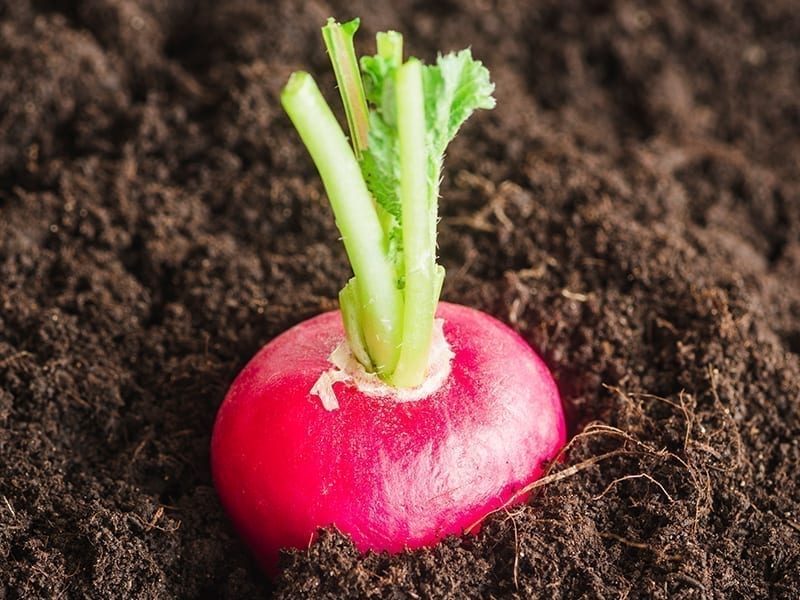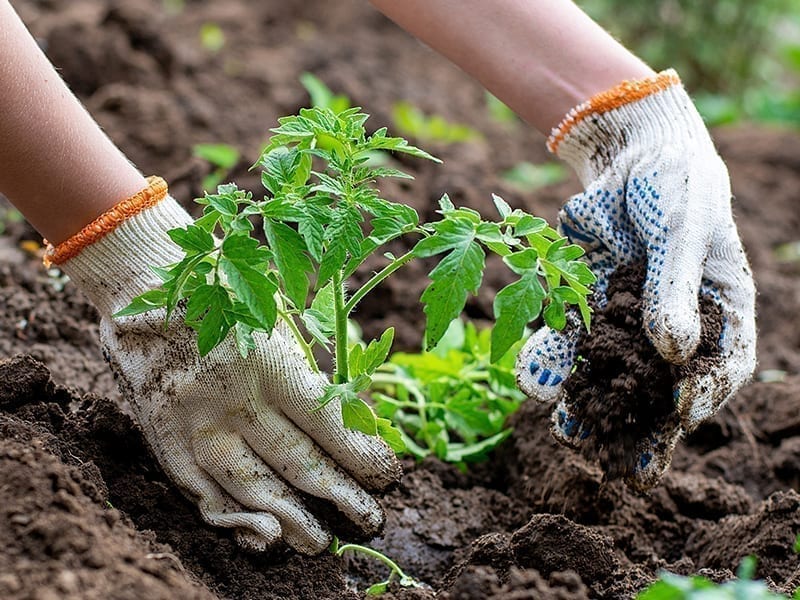With the ongoing pandemic, people have become increasingly aware of the benefits of eating locally sourced and seasonal produce for health, economic and environmental reasons. Building a home garden to grow vegetables and fruits to eat in rainy season is an effective and inexpensive means of doing just that. If you know which foods to plant, the wet and cool weather does most of the work, making the growing process enjoyable and fruitful.
Whether you are a seasoned gardener or a newbie, growing food during the monsoons is not as complicated as it sounds. Following some simple thumb rules can guarantee you a fresh and constant supply of organic vegetables and fruits for improvement in the overall health and immunity of your family.
Tips On Growing Your Own Food During Monsoons
1. Choose The Correct Fruits And Vegetables

Although drawing fruits and vegetables in the monsoons are relatively easier, choosing the right plants is also important. It is advised to pick plants that are suitable for the monsoons and good for the body during the season. Immunity building fruits and vegetables should be grown in the rainy season as they protect us against the common diseases prevalent in the season.
2. Check The Drainage System
Ensure that there is a provision for the water to flow out so that there is no stagnant water accumulation in your garden. Not only will the water make the plants rot, but it will also increase insect breeding and cause diseases.
3. Ensure Sufficient Light And Ventilation
Getting adequate sunlight in the monsoons can sometimes be a challenge. This problem especially affects the plants that need a good amount of sunlight to grow. In such cases, an alternate source of light has to be arranged. Artificial lights like fluorescent lights and grow lights can be used depending on the plants’ requirement for light, helping them grow as expected.
4. Water The Plants Only If Necessary
Very little watering is necessary during the monsoons. Hence, curb the urge to water your plants daily. On days that you do water the plants, ensure that the soil is dry and in need of watering.
5. Use Fertilisers And Pesticides
The usage of natural fertilisers and pesticides is recommended for home gardens. The chemical fertilisers and pesticides are known to have grave effects on human health. Having said that, there is a need for regular usage of fertilisers and pesticides in the rainy season as the rain tends to wash them off. One can make use of cow dung, compost and vermicompost in place of chemical fertilisers. Using earthworms in the garden is another effective way of keeping the soil fertile. In order to keep the bugs and insects at bay, natural pesticides like neem leaves, salt water spray and eucalyptus oil can be used.
6. Use The Correct Kind Of Soil
Using the best kind of soil is imperative to growing the best quality of fruits and vegetables. For growing fruits and vegetables in the monsoons efficiently, make sure that the soil you use has good water holding capacity. Usage of organic manure, the humus content of the soil and well-drained soil are other factors that play an important role in the quality of the produce.
10 Immunity-Building Fruits & Vegetables To Grow In The Monsoons
1. Cucumber
Although cucumber can be grown throughout the year, the weather in the monsoons is ideal for growing this low-calorie snack. The abundant supply of rainwater and the cool atmosphere makes it effortless to grow the cucumbers. Eating cucumbers in the monsoons is great for the immune system and provides the body with much-needed hydration. They contain potassium, manganese, copper and vitamins A, B, C and K. You can use them in salads, sandwiches, snack on cucumber slices or infuse water with them.
2. Mangoes
Surprised? Most of us don’t think of mangoes as fruits to eat in the rainy season. But there are some varieties of mangoes which can be easily grown during monsoons. Plant seeds for totapuri, chausa, langra or kesar mangoes and enjoy the mango season up until August. A mango tastes so delish that there is hardly a need for other reasons to grow it inside your house. But eating mangoes in the monsoons is ideal as the high levels of vitamin C help build immunity against the usual monsoon related diseases. You can also use mango for skin care—it will even out your skin tone and leave you glowing.
3. Bitter Gourd (Karela)
Did you know that the humble karela does more good for your body than spinach? It is one of the hassle-free monsoon vegetables to grow with a variety of health benefits. Consuming bitter gourd during monsoons is highly recommended as e it consists of a high concentration of minerals, vitamin C and antioxidants, all of which are essential to protect the body from seasonal diseases. In addition to this, the vegetable regulates blood sugar levels, making it very beneficial for diabetics.
4. Beetroot (Chukandar)
Many of us suffer from low haemoglobin levels. None of the other monsoon vegetables helps improve these levels more than the beetroot. The beetroot is a powerhouse of nutrition, consisting of impressive levels of manganese, fibre, vitamin C, potassium and iron. Consume it regularly in the form of juice, soup, salad or make chips out of it to experience health benefits like improved blood circulation and regulated blood pressure. It is a prime example of vegetables to eat in rainy season for its high immunity levels.
5. Tomato
A fruit used extensively as a vegetable, the tomato is commonly used in almost every cuisine all over the world. During monsoons when the immunity is usually compromised, growing and eating tomatoes is a delicious way to keep healthy. Tomatoes are extremely easy to grow at home and they help our bodies immensely during the monsoons. The high levels of vitamin C, vitamin K and antioxidants present in tomatoes help in protecting the body against the common monsoon related ailments.
6. Indian Blackberry (Jamun)
Another superfood that is ideal for diabetics, jamun is very helpful in regulating blood sugar levels. Not only this, but the fruit is also great for the monsoons as it can effectively cure gastric problems which are synonymous with the monsoon season. People who consume these Indian monsoon fruits can also expect to experience improvement in their blood circulation, liver and kidney functions. Jamun is rich in vitamin C, fibre and iron which are great for building immunity.
7. Radish (Mooli)
Who would have thought eating mooli ke parathe will be good for your system. Grow and eat radish with abandon this monsoon because it is so good for building your immunity during the rainy season. Radishes are of various types, sizes and colours and are extremely easy to grow at home. They help with digestion, hydration and maintaining blood pressure. The vitamin C present in radish helps build immunity and also promote repair and growth of tissues. What’s more? Eating radish can help you battle common cold and flu, a very common occurrence during the monsoons.
8. Lychee
The high water content of the fruit makes lychee an Indian monsoon fruit which grows beautifully in the rainy season. This juicy, tasty fruit can help the body deal with common cold, acidity and digestion problems. Lychee is also beneficial for asthmatic people who experience breathing difficulty in the rainy season. Along with these benefits, the lychee is also a known immunity builder for the human body.
9. Plums
A superfood that helps cure cancer, the plum is amongst the monsoon fruits you can easily grow in your home garden. Consumption of plums in the rainy season is a sure shot way to keep immunity high and monsoon-related ailments at bay. They contain vitamins C and K, potassium, fibre and copper. Known to help with smaller problems like constipation to grave diseases like cancer, plums are a must-eat in during the monsoons for their overall health and immunity benefits.
10. Apples
It is common knowledge that an apple a day keeps the doctor away. This is because the fruit contains all the possible nutrients essential for maintaining a healthy body. While consumption of apples is good for the body throughout the year, eating apples in the monsoons is highly recommended. Planting these fruits that grow in monsoon without too much effort will protect you from diseases while improving your overall health. Apples are good for your skin, bones, brain and nervous functions. Rich in phosphorus, iron, magnesium and vitamins A, B1, B2 and C, apples are the ideal monsoon fruits for all age groups.
Why Should We Eat Immunity Building Foods In Monsoons?
For the longest time, people associated monsoons only with chai and pakode. However, with the unfortunate rise in monsoon related diseases and lowered immunity levels, there is a need to strengthen the immunity levels in our body. There are innumerable monsoon related ailments resulting from mosquito breeding, waterlogging and water seepage into the supply systems. Most of these can be avoided if we consume seasonal fruits in the rainy season. These along with the knowledge of vegetables to eat in rainy season equip our immune system to fight the microorganisms which multiply at a fast rate in this season. Consumption of foods high in vitamin C, vitamin D, selenium, antioxidants and zinc along with safe, boiled water are sure to prevent monsoon related ailments like typhoid, cholera and dysentery to name a few.
As the world population grows and the supply chain struggles to deal with the demand, there are many questionable practices that are being adopted by the producers of our fruits and vegetables. These foods can have a long term negative impact on our bodies, more so in the monsoons when the spread of disease is quicker and easier. Knowing about seasonal fruits and vegetables to eat in the rainy season that are easy to grow at home gives one the assurance that the food is chemical-free, sustainable and garden-to-table.


